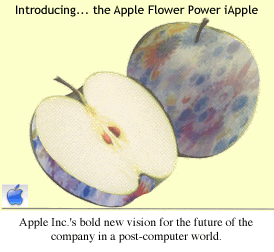
Dot com crisis
continues to deepen
Corporations
shunning all things silicon, returning to cans tied together with string
By Colm Pewter
True Dork Times Technology Editor
 CUPERTINO,
California (TDT). As the spectacular decline of the NASDAQ market
nears its one-year anniversary, Silicon Valley executives are muttering
privately that the technology sector has yet to see its darkest days.
Having long since abandoned the legions of fanciful web-based startup companies
that crested in 2000, jittery investors are now focusing their ire on the
backbone of the cyber industry: the hardware and software manufacturers
that power the world's computers.
CUPERTINO,
California (TDT). As the spectacular decline of the NASDAQ market
nears its one-year anniversary, Silicon Valley executives are muttering
privately that the technology sector has yet to see its darkest days.
Having long since abandoned the legions of fanciful web-based startup companies
that crested in 2000, jittery investors are now focusing their ire on the
backbone of the cyber industry: the hardware and software manufacturers
that power the world's computers.
"We've had more than corporate client tell us this month that they're
ripping out all their computers, and going back to pencil and paper," Oracle
CEO Larry Ellison grimaced yesterday, in front of a packed room here at
the Apple campus. "And it's not just computers - all the IT sectors
are affected. Some companies say they're replacing their digital videoconferencing
systems with cans tied together with string. These are dire times,
and we may need to diversify to stay solvent."
Apple chief Steve Jobs had similarly dour news in his keynote address.
"We've all seen the footage on CNN of offices dumping cartloads of computers
off twenty-storey buildings, down onto the sidewalks. Yes, we all
had a good laugh when it was just Intel boxes smashing into the pavement.
But now it's Macs, SPARC stations and Silicon Graphics machines!
The end is near!"
Meanwhile, the low-tech revolt is having a ripple effect on other communities
near Silicon Valley. Berkeley police have been run ragged as several
violent clashes have erupted between the existing population of homeless
street punks, and the massive numbers of fresh immigrant homeless, almost
entirely former dot-com employees. The Gilman Street punks consider
the parks and alleyways of the area their turf, and have frequently beaten
and kicked the new arrivals, screaming "Go home, nerds!"
While this may seem to be a Luddite counter-revolution, several industrial
sources say that computers never brought them the profits they expected,
and in fact, damaged worker productivity and morale. One GM executive,
for example, gave this anonymous critique: "Our employees would just
sit around all day, watching their stock values drop, then go back to downloading
porn. People ask us how we can get anything done without computers.
My question is: when did we ever get anything done with computers?"
The executive later explained that he was keeping the computer on his desk,
"but only for, uh, research purposes."
As investors flee these cyber stalwarts like rats from a sinking ship,
many of the former silicon titans are now left with the unpleasant prospect
of trying to put out non-digital products to keep their companies afloat.
At many companies, this process has already been in the works for several
months.
Microsoft, long the investment darling among the software manufacturers,
has decided to start selling real, 100% glass windows. "The good
thing is, these break often, so it's just like forcing the user to upgrade
every 18 months," a visibly poorer, but chipper Bill Gates announced.
Apple, whose market share reflects its long history of razor-sharp perception
of consumer wants and desires, has opted for a more technology-laden backup
product line. "As of today, we will now begin selling our own strain
of genetically-modified apples, which will come in a series of designer
colors and patterns," beamed Jobs, proudly, as a twenty-foot-high Granny
Smith bearing Apple's "blue dalmation" color scheme lit up the screen behind
him. "Our market research suggests that the public will absolutely love
this."
Back to the True Dork Times
 CUPERTINO,
California (TDT). As the spectacular decline of the NASDAQ market
nears its one-year anniversary, Silicon Valley executives are muttering
privately that the technology sector has yet to see its darkest days.
Having long since abandoned the legions of fanciful web-based startup companies
that crested in 2000, jittery investors are now focusing their ire on the
backbone of the cyber industry: the hardware and software manufacturers
that power the world's computers.
CUPERTINO,
California (TDT). As the spectacular decline of the NASDAQ market
nears its one-year anniversary, Silicon Valley executives are muttering
privately that the technology sector has yet to see its darkest days.
Having long since abandoned the legions of fanciful web-based startup companies
that crested in 2000, jittery investors are now focusing their ire on the
backbone of the cyber industry: the hardware and software manufacturers
that power the world's computers.